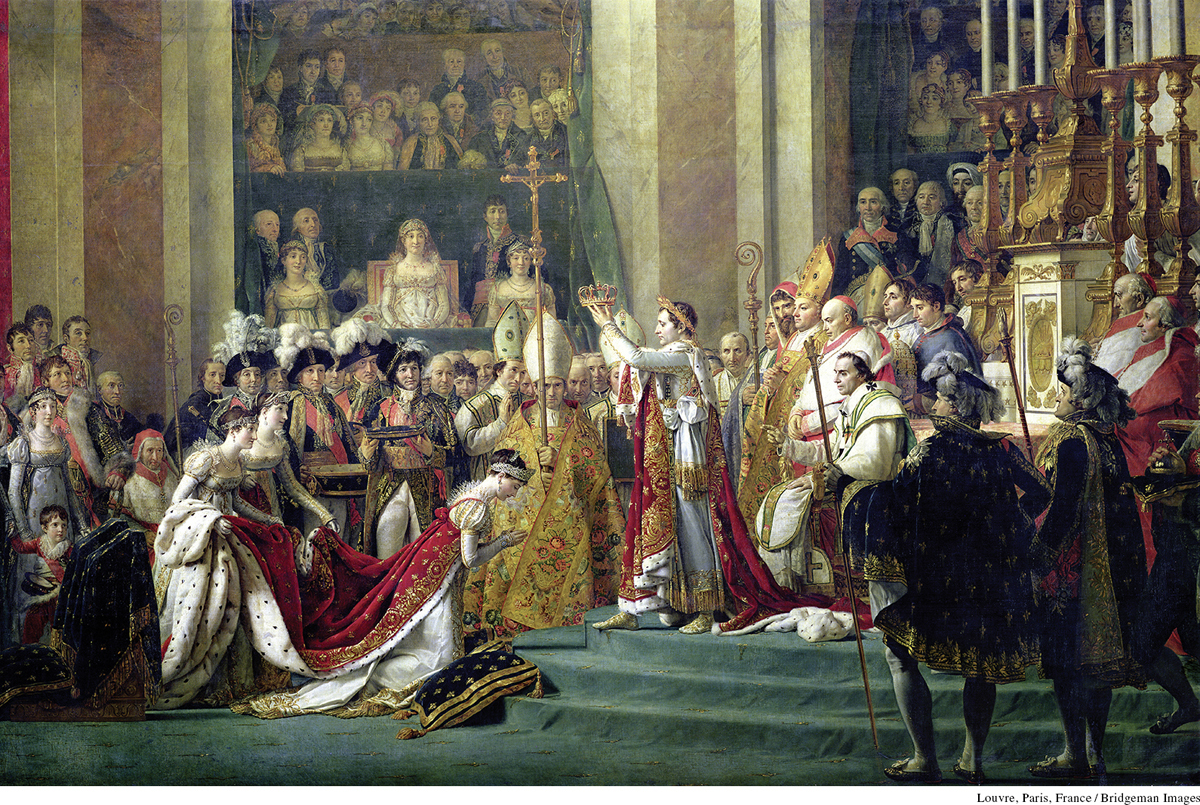From Republic to Empire
Printed Page 641
Important EventsFrom Republic to Empire
When the constitution of 1799 made Napoleon the First Consul (of three), it gave him the right to pick the Council of State, which drew up all laws. The French government was no longer representative in any real sense: the new constitution eliminated direct elections for deputies and granted no independent powers to the three houses of the legislature. Napoleon and his advisers chose the legislature’s members out of a small pool of “notables.” Almost all men over twenty-one could vote in the plebiscite (referendum) to approve the constitution, but their only option was to choose yes or no.
Napoleon’s most urgent task was to reconcile to his regime Catholics who had been alienated by revolutionary policies. Although nominally Catholic, Napoleon held no deep religious convictions. “How can there be order in the state without religion?” he asked cynically. “When a man is dying of hunger beside another who is stuffing himself, he cannot accept this difference if there is not an authority who tells him: ‘God wishes it so.’” In 1801, a concordat with Pope Pius VII (r. 1800–1823) ended a decade of church-state conflict in France. The pope validated all sales of church lands, and the government agreed to pay the salaries of bishops and priests who would swear loyalty to the state. Catholicism was officially recognized as the religion of “the great majority of French citizens.” (The state also paid Protestant pastors’ salaries.)
Napoleon continued the centralization of state power that had begun under the absolutist monarchy of Louis XIV. As First Consul, he appointed prefects who directly supervised local affairs in every department in the country. He created the Bank of France to facilitate government borrowing and relied on gold and silver coinage rather than paper money. He improved tax collection but balanced the budget only by exacting tribute from the territories he conquered.
Napoleon never relied on mass executions to maintain control, but he refused to allow those who opposed him to meet in clubs, influence elections, or publish newspapers. A decree reduced the number of newspapers in Paris from seventy-three to thirteen (and then finally to four). Government censors had to approve all operas and plays, and they banned “offensive” artistic works even more frequently than their royal predecessors had. The minister of police, Joseph Fouché, once a leading figure in the Terror of 1793–1794, imposed house arrest, arbitrary imprisonment, and surveillance of political dissidents. Political contest and debate shriveled to almost nothing. When a bomb attack on Napoleon’s carriage failed in 1800, Fouché suppressed the evidence of a royalist plot and instead arrested hundreds of former Jacobins.
When it suited him, Napoleon also struck against royalist conspirators. In 1804, he ordered his police to kidnap the duke d’Enghien from his residence in Germany. Napoleon had intelligence, which proved to be false, that d’Enghien had joined a plot in Paris against him. Even when he learned the truth, he insisted that a military tribunal try d’Enghien, a close relative of the dead king Louis XVI. After a summary trial, d’Enghien was shot on the spot.
By then, Napoleon’s political intentions had become clear. He had named himself First Consul for life in 1802, and in 1804, with the pope’s blessing, he crowned himself emperor. Once again, plebiscites approved his decisions but only yes/no alternatives were offered.
Napoleon’s face and name soon adorned coins, engravings, histories, paintings, and public monuments. His favorite painters embellished his legend by depicting him as a warrior-hero of mythic proportions even though he was short and physically unimpressive in person. He embarked on ostentatious building projects, including the Arc de Triomphe and the Stock Exchange.
Napoleon worked hard at establishing his reputation as an efficient administrator with broad intellectual interests. When not on military campaigns, he worked on state affairs, usually until 10:00 p.m., taking only a few minutes for each meal. To establish his authority, Napoleon relied on men who had served with him in the army. His bureaucracy was based on a patron-client relationship, with Napoleon as the ultimate patron.

Combining aristocratic and revolutionary values in a new social hierarchy that rewarded merit and talent, Napoleon personally chose as senators the nation’s most illustrious men, among them former nobles. Intending to replace both the old nobility of birth and the republic’s strict emphasis on equality, in 1802 he took the first step toward creating a new nobility by founding the Legion of Honor. (Members of the legion received lifetime pensions along with their titles.) In 1808, Napoleon introduced a complete hierarchy of noble titles, ranging from princes down to barons and chevaliers. To go along with their new titles, Napoleon gave his favorite generals huge fortunes, often in the form of estates in the conquered territories. (See “Seeing History: The Clothing Revolution: The Social Meaning of Changes in Postrevolutionary Fashion.”)
Napoleon’s own family reaped the greatest benefits. He made his older brother, Joseph, ruler of the newly established kingdom of Naples in 1806, the same year he installed his younger brother Louis as king of Holland. He proclaimed his twenty-three-year-old stepson, Eugène de Beauharnais, viceroy of Italy in 1805 and established his sister Caroline and brother-in-law General Joachim Murat as king and queen of Naples in 1808 when he moved Joseph to the throne of Spain. Napoleon wanted to establish an imperial succession, but he lacked an heir. In thirteen years of marriage, his wife, Josephine, had borne no children, so in 1809 he divorced her and in 1810 married the eighteen-year-old princess Marie-Louise of Austria. The next year Marie-Louise gave birth to a son, to whom Napoleon immediately gave the title king of Rome.